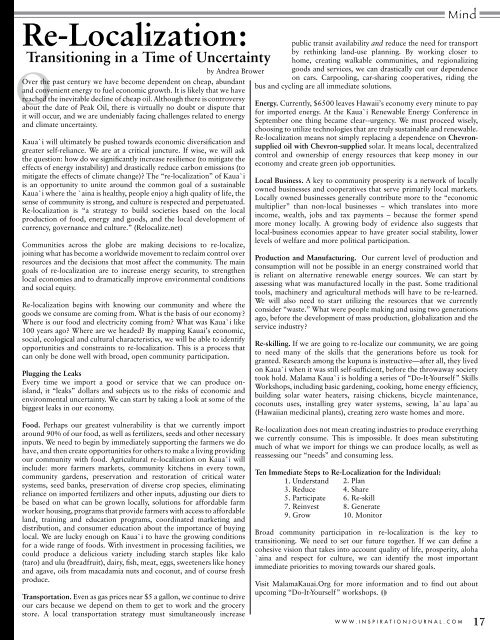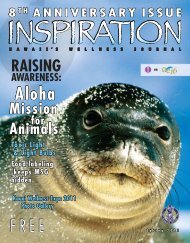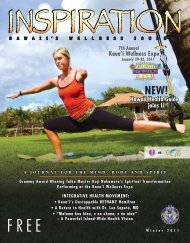Inspiring Leadership The Spirit of Love by Dr - Inspiration Journal ...
Inspiring Leadership The Spirit of Love by Dr - Inspiration Journal ...
Inspiring Leadership The Spirit of Love by Dr - Inspiration Journal ...
Create successful ePaper yourself
Turn your PDF publications into a flip-book with our unique Google optimized e-Paper software.
Re-Localization:<br />
Transitioning in a Time <strong>of</strong> Uncertainty<br />
<strong>by</strong> Andrea Brower<br />
Over the past century we have become dependent on cheap, abundant<br />
and convenient energy to fuel economic growth. It is likely that we have<br />
reached the inevitable decline <strong>of</strong> cheap oil. Although there is controversy<br />
about the date <strong>of</strong> Peak Oil, there is virtually no doubt or dispute that<br />
it will occur, and we are undeniably facing challenges related to energy<br />
and climate uncertainty.<br />
Kaua`i will ultimately be pushed towards economic diversification and<br />
greater self-reliance. We are at a critical juncture. If wise, we will ask<br />
the question: how do we significantly increase resilience (to mitigate the<br />
effects <strong>of</strong> energy instability) and drastically reduce carbon emissions (to<br />
mitigate the effects <strong>of</strong> climate change)? <strong>The</strong> “re-localization” <strong>of</strong> Kaua`i<br />
is an opportunity to unite around the common goal <strong>of</strong> a sustainable<br />
Kaua`i where the `aina is healthy, people enjoy a high quality <strong>of</strong> life, the<br />
sense <strong>of</strong> community is strong, and culture is respected and perpetuated.<br />
Re-localization is “a strategy to build societies based on the local<br />
production <strong>of</strong> food, energy and goods, and the local development <strong>of</strong><br />
currency, governance and culture.” (Relocalize.net)<br />
Communities across the globe are making decisions to re-localize,<br />
joining what has become a worldwide movement to reclaim control over<br />
resources and the decisions that most affect the community. <strong>The</strong> main<br />
goals <strong>of</strong> re-localization are to increase energy security, to strengthen<br />
local economies and to dramatically improve environmental conditions<br />
and social equity.<br />
Re-localization begins with knowing our community and where the<br />
goods we consume are coming from. What is the basis <strong>of</strong> our economy?<br />
Where is our food and electricity coming from? What was Kaua`i like<br />
100 years ago? Where are we headed? By mapping Kauai’s economic,<br />
social, ecological and cultural characteristics, we will be able to identify<br />
opportunities and constraints to re-localization. This is a process that<br />
can only be done well with broad, open community participation.<br />
Plugging the Leaks<br />
Every time we import a good or service that we can produce onisland,<br />
it “leaks” dollars and subjects us to the risks <strong>of</strong> economic and<br />
environmental uncertainty. We can start <strong>by</strong> taking a look at some <strong>of</strong> the<br />
biggest leaks in our economy.<br />
Food. Perhaps our greatest vulnerability is that we currently import<br />
around 90% <strong>of</strong> our food, as well as fertilizers, seeds and other necessary<br />
inputs. We need to begin <strong>by</strong> immediately supporting the farmers we do<br />
have, and then create opportunities for others to make a living providing<br />
our community with food. Agricultural re-localization on Kaua`i will<br />
include: more farmers markets, community kitchens in every town,<br />
community gardens, preservation and restoration <strong>of</strong> critical water<br />
systems, seed banks, preservation <strong>of</strong> diverse crop species, eliminating<br />
reliance on imported fertilizers and other inputs, adjusting our diets to<br />
be based on what can be grown locally, solutions for affordable farm<br />
worker housing, programs that provide farmers with access to affordable<br />
land, training and education programs, coordinated marketing and<br />
distribution, and consumer education about the importance <strong>of</strong> buying<br />
local. We are lucky enough on Kaua`i to have the growing conditions<br />
for a wide range <strong>of</strong> foods. With investment in processing facilities, we<br />
could produce a delicious variety including starch staples like kalo<br />
(taro) and ulu (breadfruit), dairy, fish, meat, eggs, sweeteners like honey<br />
and agave, oils from macadamia nuts and coconut, and <strong>of</strong> course fresh<br />
produce.<br />
Transportation. Even as gas prices near $5 a gallon, we continue to drive<br />
our cars because we depend on them to get to work and the grocery<br />
store. A local transportation strategy must simultaneously increase<br />
W W W . I N S P I R A T I O N J O u R N A L . C O m<br />
Mind<br />
public transit availability and reduce the need for transport<br />
<strong>by</strong> rethinking land-use planning. By working closer to<br />
home, creating walkable communities, and regionalizing<br />
goods and services, we can drastically cut our dependence<br />
on cars. Carpooling, car-sharing cooperatives, riding the<br />
bus and cycling are all immediate solutions.<br />
Energy. Currently, $6500 leaves Hawaii’s economy every minute to pay<br />
for imported energy. At the Kaua`i Renewable Energy Conference in<br />
September one thing became clear--urgency. We must proceed wisely,<br />
choosing to utilize technologies that are truly sustainable and renewable.<br />
Re-localization means not simply replacing a dependence on Chevronsupplied<br />
oil with Chevron-supplied solar. It means local, decentralized<br />
control and ownership <strong>of</strong> energy resources that keep money in our<br />
economy and create green job opportunities.<br />
Local Business. A key to community prosperity is a network <strong>of</strong> locally<br />
owned businesses and cooperatives that serve primarily local markets.<br />
Locally owned businesses generally contribute more to the “economic<br />
multiplier” than non-local businesses – which translates into more<br />
income, wealth, jobs and tax payments – because the former spend<br />
more money locally. A growing body <strong>of</strong> evidence also suggests that<br />
local-business economies appear to have greater social stability, lower<br />
levels <strong>of</strong> welfare and more political participation.<br />
Production and Manufacturing. Our current level <strong>of</strong> production and<br />
consumption will not be possible in an energy constrained world that<br />
is reliant on alternative renewable energy sources. We can start <strong>by</strong><br />
assessing what was manufactured locally in the past. Some traditional<br />
tools, machinery and agricultural methods will have to be re-learned.<br />
We will also need to start utilizing the resources that we currently<br />
consider “waste.” What were people making and using two generations<br />
ago, before the development <strong>of</strong> mass production, globalization and the<br />
service industry?<br />
Re-skilling. If we are going to re-localize our community, we are going<br />
to need many <strong>of</strong> the skills that the generations before us took for<br />
granted. Research among the kupuna is instructive—after all, they lived<br />
on Kaua`i when it was still self-sufficient, before the throwaway society<br />
took hold. Malama Kaua`i is holding a series <strong>of</strong> “Do-It-Yourself ” Skills<br />
Workshops, including basic gardening, cooking, home energy efficiency,<br />
building solar water heaters, raising chickens, bicycle maintenance,<br />
coconuts uses, installing grey water systems, sewing, la`au lapa`au<br />
(Hawaiian medicinal plants), creating zero waste homes and more.<br />
Re-localization does not mean creating industries to produce everything<br />
we currently consume. This is impossible. It does mean substituting<br />
much <strong>of</strong> what we import for things we can produce locally, as well as<br />
reassessing our “needs” and consuming less.<br />
Ten Immediate Steps to Re-Localization for the Individual:<br />
1. Understand 2. Plan<br />
3. Reduce 4. Share<br />
5. Participate 6. Re-skill<br />
7. Reinvest 8. Generate<br />
9. Grow 10. Monitor<br />
Broad community participation in re-localization is the key to<br />
transitioning. We need to set our future together. If we can define a<br />
cohesive vision that takes into account quality <strong>of</strong> life, prosperity, aloha<br />
`aina and respect for culture, we can identify the most important<br />
immediate priorities to moving towards our shared goals.<br />
Visit MalamaKauai.Org for more information and to find out about<br />
upcoming “Do-It-Yourself ” workshops.<br />
17





